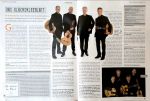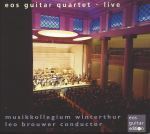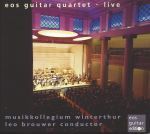reviewsMeldungen 1 bis 5 von 5 17.08.2021 17.08.2021 Akustik Gitarre Magazine August/September 2021 By Harald Wittig
The lucky clover
Eos Guitar Quartet - The Swiss guitar quartet is one of the best ensembles of its kind. For its 30th anniversary, this lucky clover has realized a very special project.
There are not many guitar quartets, world-class ensembles can be counted on half a hand. Undoubtedly, the Zurich-based Eos Guitar Quartet, which takes its name from the Greek goddess of dawn, is one of the top representatives of this formation. The quartet's first album appeared 30 years ago, in 1991, with the lineup of Marcel Ege, Martin Pirktl, David Sautter and Michael Winkler. In 2013, founding member Martin Pirktl left, and since then Argentine Julio Azcano has been playing in the Eos Guitar Quartet, which, while maintaining a consistently high level of interpretation, not only delights classical music purists with its extraordinary repertoire. The fortunate shamrock has always proven to have open ears for world music, with numerous releases such as the album '20 +', featuring compositions by Ralph Towner, John McLaughlin, Egberto Gismonti and Paco de Lucia in exceptional arrangements and interpretations. The Swiss' current project is called "El alma de Paco" (Paco's Soul), has been released in time for the quartet's 30th anniversary and is a tribute to Paco de Lucia, whom the musicians greatly admire. A very happy Michael Winkler reveals in an interview everything worth knowing about this project.
How nice Michael, that you found the time for a conversation. Let's get straight to the point. What is the Paco project about?
Paco was the best. We agreed on that. We knew him well and visited him often when he was in Zurich. When he died, it was a shock for us. The music world without him? Unimaginable. So we decided to pay our respects and conceive this album. As the title suggests, which translates as "Paco's soul", the project was not going to contain pieces by Paco, but works by other composers that honor him, the maestro. So we asked several composers to write a piece for us and this project. We combined these new works with original compositions by Marcel and David, as well as arrangements by Manuel de Falla. Paco greatly admired their music and interpreted it in his own way, so de Falla's arrangements complete the program perfectly.
Who wrote for this project?
Flamenco guitarist and composer José Antonio Rodríguez wrote a long three-movement piece for us that is the closest to flamenco and is appropriately titled "El alma de Paco". Then we were again lucky enough to have Leo Brouwer - a self-confessed Paco fan - write a three-movement composition for us as well. Leo refers to Paco's album "Live in America" and uses motifs from the rondeña 'Mi Niño Curro'. However, it is a genuine Brouwer piece that speaks of his sound language with echoes of Paco's music and flamenco techniques.
Is it difficult to play Brouwer's piece? How long does it usually take you to rehearse new pieces?
Yes, it is very difficult and we always take a lot of time. There is nothing worse than putting fresh music on stage or recording it as soon as possible. We always do it calmly, we work those pieces very carefully, we take our time until we are completely with the music and it's inside us. In the case of Leo's composition, it was about a year and a half in the studio until we released it in 2019.
The third famous musician in this round table of composers is John McLaughlin, how did you get him, a world star after all, to write something for you?
John had already given us a piece, 'Lighthouse', for our 20th anniversary. We've been in touch ever since. In fact, John always gets back to me immediately when I write him an email. He is a very kind soul. When I told him about this project, he jumped on board quickly. Because he had a piece, it's called 'Dreaming of Sound,' that he had composed for Paco and for him. He wrote: "Then I lost Paco and I kept it, because who was going to play it?". He agreed to give us 'Soñando con el sonido' -for free, by the way- and sent us the score. Julio then made an arrangement for our instrumentation. John's piece closes the album. By the way, he has listened to it in the meantime and he is full of praise.
Admirable. You also have guests on the album: the magnificent flamenco singer Carmen Linares can be heard on two pieces. There is also the excellent percussionist Ricardo Espinosa, who is also a major player on the flamenco scene. Have you been working with both of them for a long time?
With Carmen since 1999 and we have also known Ricardo for a long time. They are both wonderful musicians who enrich this album congenially with their colors, so that the project also breathes with the soul of flamenco. However, we could not record together due to the pandemic. Carmen and Ricardo sang and recorded their parts in a studio in Madrid. But it worked very well and we all liked the premaster.
Let's move on to production: Where did you record?
We were very lucky to be able to record in the big hall of the SFR (Swiss Radio and Television). We were allowed four days, including the sound engineer: fantastic. This hall was built in the 1950s and has overwhelming acoustics. Even the softest sound can be heard clearly, creating sound in such an environment is a pure pleasure. However, we couldn't record the whole album at the SFR. The rest we recorded at Hardstudios with Moritz Wetter. He is an exceptional sound engineer in whom we can trust blindly. He knows the SFR room very well and was able to recreate the sound perfectly. But recording in the dry recording room, with the distance and the mask, took some getting used to.
Did you also use the flamenco guitars?
Yes, we did. On the Brouwer, for example, we mixed the flamenco sound with our classical guitars. In Rodriguez we only played the flamenco guitars, just like in Marcel and David's pieces. We made the decision spontaneously.
Basically, you prefer traditionally built guitars?
Exactly - no double tops, because sonority and the guitar, which is a silent instrument, don't go together. We also cultivate the Spanish technique and do a lot of Apoyando. The modern pulling style is honorable and certainly optimal for solo polyphonic works. But to emphasize a melodic part in a quartet, the Apoyando is the most appropriate. Besides, this is the Spanish sound. The Spanish soul, so to speak.
Which closes the circle nicely. Thank you very much for this pleasant conversation. more... 11.11.2017 11.11.2017 Classical Guitar Magazine Winter 2017 Eos Guitar Quartet: Live  22.09.2017 22.09.2017 Minor 7th Reviewing the best in non-mainstream acoustic guitar music Sept/Oct 2017 Eos Guitar Quartet - Live 03.04.2013 PRESS REPORTS "Eos is the rosy-fingered goddess of dawn. Forget all about early morning sleepiness: when the 02.04.2012 Virtuos kommuniziert - Der Landbote 02.04.2012 Ralph Towner & Eos Guitar Quartet "In Guitar" Festival Winterthur more... |

eos guitar quartet-Video
